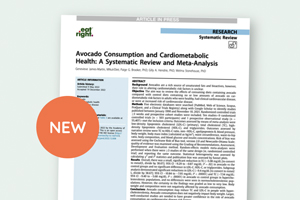More fibre and potassium, as well as less red and processed meats, are among the dietary benefits of eating an avocado a day, according to new US research.
The secondary analysis of the Habitual Diet and Avocado Trial (HAT) found participants eating an avocado a day, for six months, had an improvement in overall diet quality.
This included a decreased intake of animal-based protein from red and processed meats and an increased intake of fibre and potassium.
The study, published in the journal Current Developments in Nutrition, was the first to investigate the effect of eating one large avocado a day on food and nutrient displacement.
The participants eating an avocado a day had a higher daily intake of energy (159±575 kcal) (P < 0.001), potassium (3193±817 mg vs. 2419±843 mg) (P <0.005), fibre (30±8 g vs. 19±9 g) (P <0.05), and a lower daily intake of animal protein (49±33 g vs. 55±24 g) (P=0.02) compared to the habitual diet group.
Partial displacement with an avocado was observed for energy (43%), total fat (23%), and carbohydrate (87%), indicating a lower intake of these nutrients from non-avocado sources.
The researchers concluded that eating an avocado daily positively changed diet composition and quality.
They also highlighted the reduction in animal protein intake, particularly from red and processed meat, as ‘noteworthy’ given the established associations of these foods with higher risks of type 2 diabetes, coronary heart disease, and colorectal cancer.
More about HAT:
The HAT (Habitual Diet and Avocado Trial) is a US multi-site, free-living, parallel-arm study comparing one avocado a day (AVO) and a habitual diet (HAB) in almost 1000 participants.
Previous HAT studies found after six months of eating an avocado a day, AVO participants had a higher energy intake, but less than expected with the inclusion of avocado, and no significant difference in body weight. This observation prompted further research into whether regular avocado consumption altered overall diet quality by displacing energy and nutrients from alternative food sources.
This secondary analysis of HAT data study had a large sample size of 898 participants, aged 25 – 87 years (male and female) with a Body Mass Index (BMI) range of 20.5 to 60.3 kg/m 2 and used multiple 24-hour dietary recalls for dietary assessment for six months.
Other HAT research found with an avocado a day was positively associated with:
- Improved diet quality and cholesterol without weight gain
- Improved fatty acid profile in red blood cells
Practice tips
- Encourage daily avocado consumption to enhance dietary quality, especially for people with obesity
- A serving of avocado is 75g (half a medium avocado) and can count as a serve of vegetables
- Provide practical advice to enjoy avocados daily, such as meal ideas, recipes, and serving suggestions to promote daily avocado consumption
References
Clarke A E, LeBeau KS, Oda K, Segovia-Siapco G et al. The Effect of Daily Avocado Intake on Food and Nutrient Displacement in a Free-Living Population with Abdominal Obesity. Current Developments in Nutrition 104451, Aug 26, 2024



